Thien Long CEO: Building Global Success Starts with a Strong Foundation at Home
15 Sep 2025
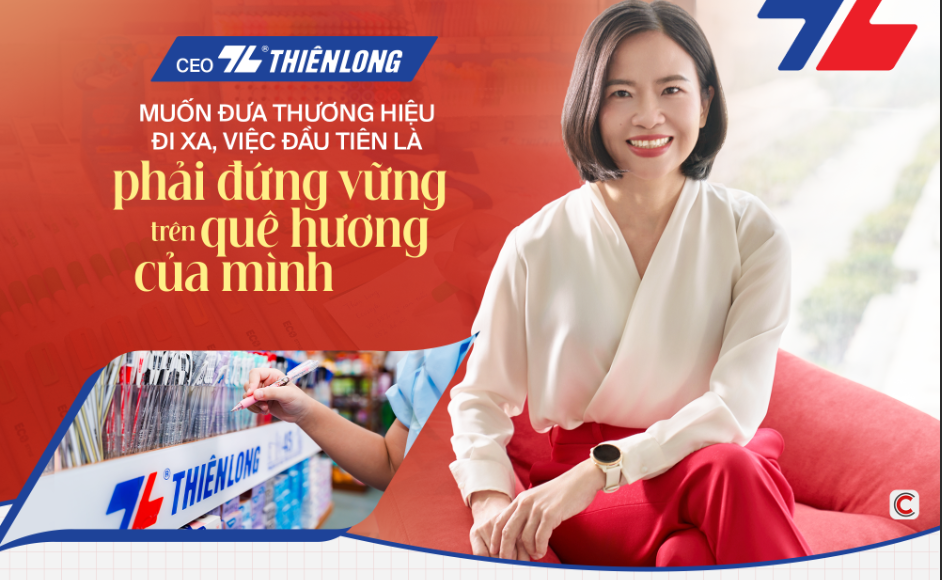
“Over nearly 45 years of establishment and development, from a modest ballpoint pen workshop, Thien Long – a Vietnamese enterprise – has grown into one of the leading stationery corporations in the region. Ms. Tran Phuong Nga, CEO of Thien Long Group, shared deep insights about this resilient journey, the core values that have shaped a ‘national brand,’ and the strategy to bring ‘Vietnamese prestige’ to the global stage.”
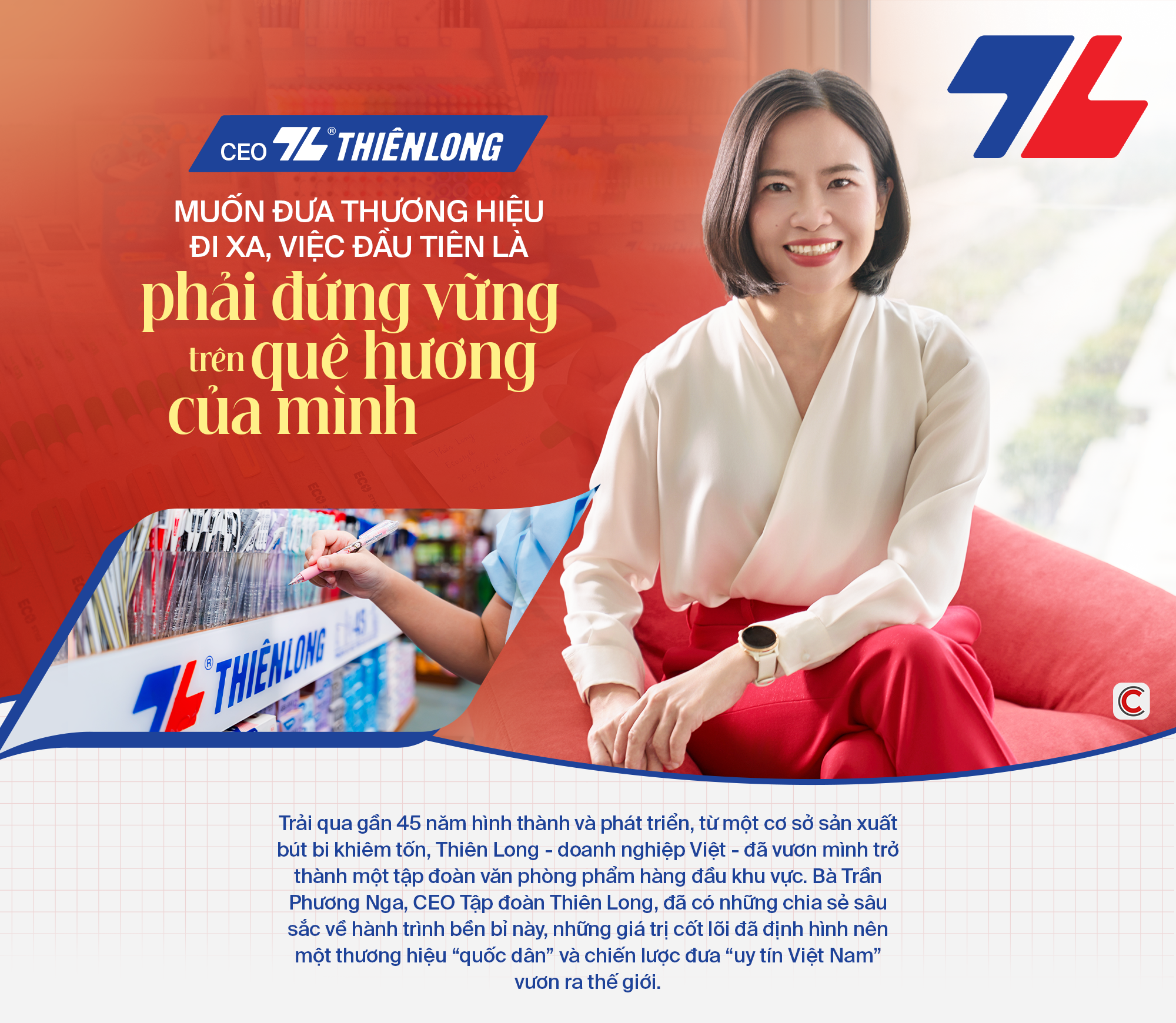
Thien Long has undergone nearly 45 years of formation and development, from a small ballpoint-pen workshop to a leading stationery group in the region. In your view, what has driven this enduring success, and what core values have shaped Thien Long’s brand story?
Tran Phuong Nga: Thien Long was born at a time when the national economy faced many hardships and study supplies were scarce, so our products were warmly received. Almost every Vietnamese person has used Thien Long products at some point; as a result, our brand is associated with values like closeness, familiarity, and the stature of a “national brand.”
The brand’s lasting vitality stems from the fact that, from the very beginning, we treated product quality as our central pillar—the compass for everything we do. Alongside that, our distribution system has been a decisive strength, helping our products reach consumers widely and be present everywhere.
In short, practical products, durable quality, and a widespread distribution network have forged Thien Long’s spirit and values. For nearly 45 years, our success has been built on an unwavering commitment to quality combined with the team’s constant spirit of innovation—all in service of Vietnamese learners. From a small workshop, Thien Long has grown into a leading stationery group in the region.
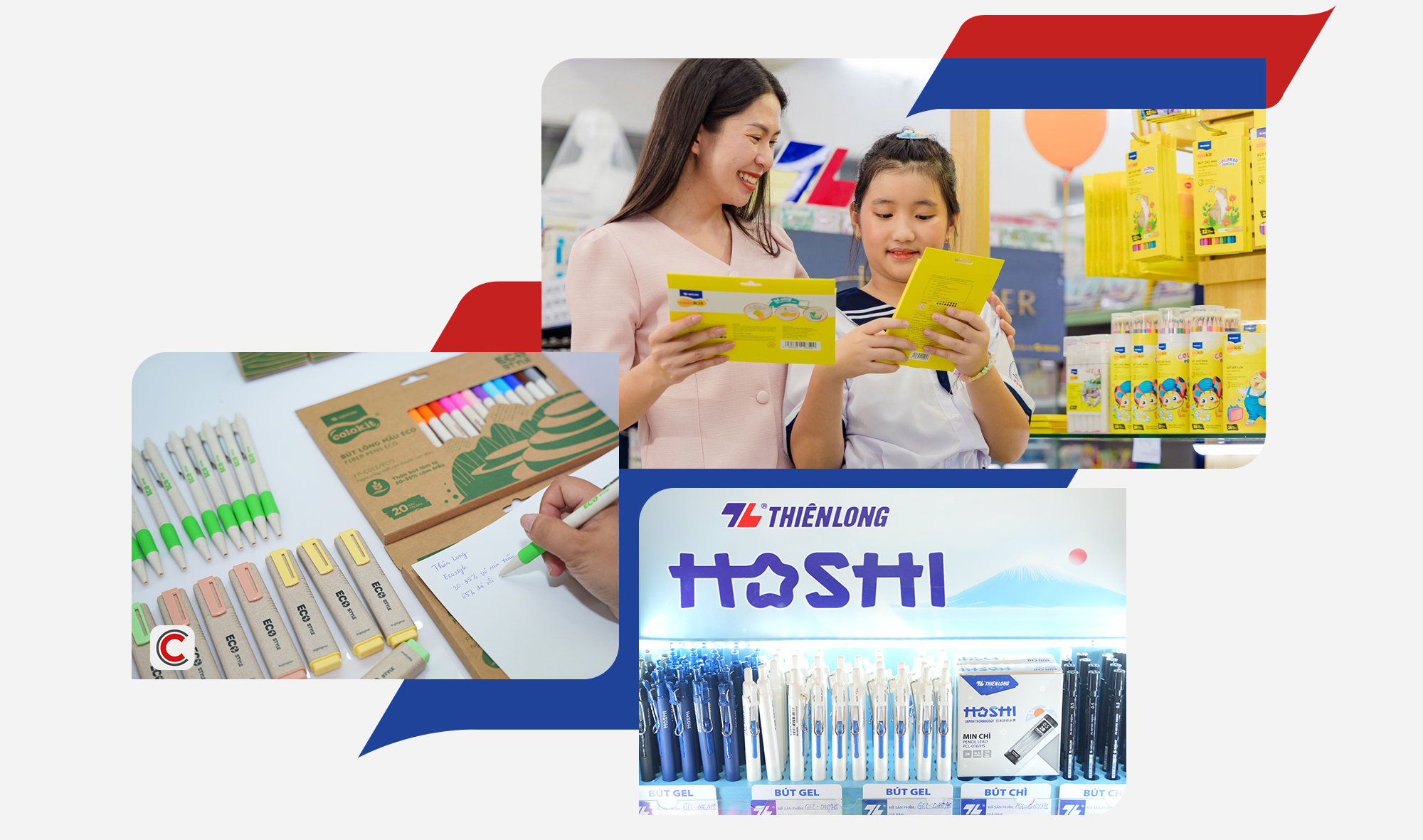
Thien Long started with ballpoint pens. When expanding into other stationery categories, did the group face difficulties or challenges with any specific product?
The journey to develop new products has not been easy. Today, Thien Long’s portfolio numbers in the thousands, including both writing instruments and other stationery products.
Every product tells a story of deliberation, exploration, creativity, and difficulties and setbacks. Not every launch succeeds, and success requires sustained investment and learning. For example, to develop our file/folder product line, we invested in a specialized factory in Long Thanh. For glue sticks, we invested in a large-scale production line with modern machinery, meeting U.S. standards and earning high praise from customers. This expansion has been a continuous learning journey—learning the product, mastering technology and materials, and especially understanding consumers.
We’re proud to have overcome many challenges. For instance, we successfully developed an art-supply line, including fiber-tip color markers that require stricter manufacturing than ordinary pens. Another example is our specialty medical markers exported to the U.S. To produce them, we must meet extremely stringent quality standards, including environmental controls to ensure microbiological requirements.
To be embraced by consumers, products must not only be good and attractive but also strike the right chord with their psychology and needs. To achieve that, with some products, we accepted OEM work for foreign partners for about two years to learn knowledge, experience, and techniques. For others, we figured things out ourselves and went through many difficulties, because stationery is an inherently diverse industry.
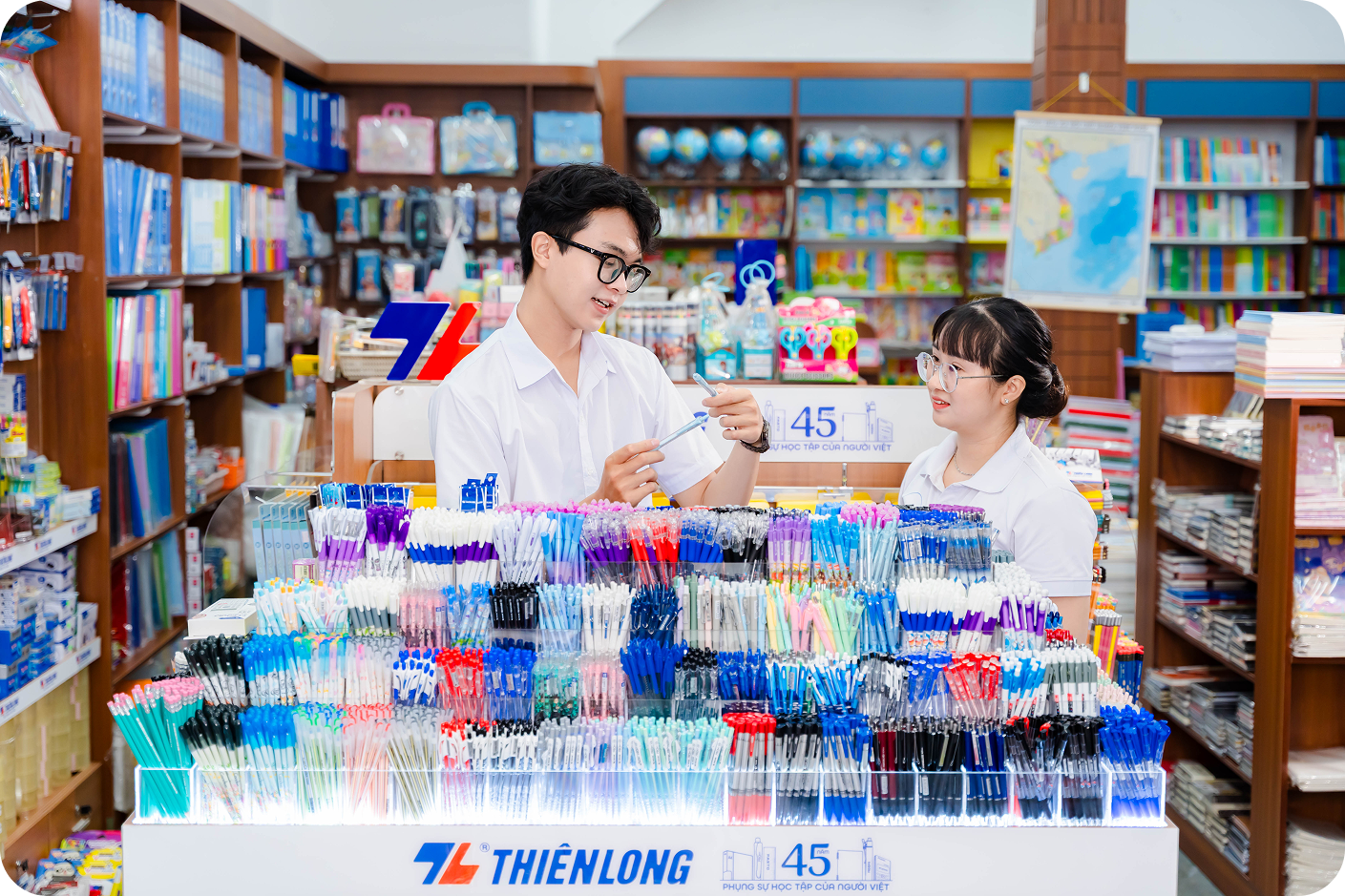
Thien Long has built an ecosystem of thousands of products serving diverse users—from students to businesspeople. How was this ecosystem strategy formed, and how do you ensure each brand has its own identity yet remains aligned with the group’s vision?
Our ecosystem strategy was defined early: not merely “doing business,” but moving in step with consumer trends. The widening and deepening needs of Vietnamese consumers, together with expansion into international markets, are the foundation of this strategy. Ensuring brand consistency becomes even more complex when we operate beyond Vietnam.
No matter the market we serve, we keep the mindset of a Vietnamese enterprise, for Vietnamese consumers. Currently, Thien Long has three sub-brands in Vietnam plus FlexOffice for international markets. Consistency across brands stems from a simple belief: at every life stage, everyone needs a companion in learning and work.
From that “companion” idea, each sub-brand carries its own personality and imprint, yet all share the core value of “serving an inspiring journey of learning and play.” The red thread throughout is a lifelong learning spirit, with different learning modes for each stage.
To ensure consistency, we conduct extensive surveys and market research so every product and brand truly touches consumers’ needs and emotions—being a companion that both serves learning and inspires it.
The red thread connecting all brands is our core value of quality and reliability. For example, regardless of target user or price segment, writing quality must be absolutely assured. Even an affordable pen must write clean, consistent lines down to the last drop of ink. For products aimed at professionals or artists, we offer not only quality but also a spirit of innovation.
Above all is a spirit of serving customers. This spirit permeates our culture and our people, and it shows in every product. Some products are difficult to make and have low margins, yet we still find ways to optimize costs. Our service mindset and commitment to quality never change—we never trade quality for price.

On that note about pens, I’m curious: how does the ink quality differ between regular writing pens and premium signature pens?
The inks are very different. Each ink is formulated to match specific needs and users. Premium designs have elevated structures and materials, and each tip type has a distinct size, structure, and materials. Technical factors like materials and ink viscosity are extremely complex. During production, we must precisely control temperature, the manufacturing environment, and equipment to ensure optimal performance. Moreover, signature-pen ink must be durable and non-fading for many years.
Which export market has been the most difficult for Thien Long to penetrate?
The United States is a major challenge. We currently export mainly under OEM rather than our own brand there. The U.S. retail environment allows very few new brands to enter major chains; it requires many intermediaries and huge investment. After careful calculation relative to market size, we’ve decided not to prioritize brand entry for now. However, we work closely with U.S. partners on product development, leveraging our own technology and machinery.

Thien Long now has over 55,000 retail points domestically and exports to more than 70 countries. How has the group leveraged this distribution network to reinforce brand credibility?
We deeply value our distribution system—it’s the fruit of over four decades of work and a sustainable asset. We view our 55,000+ retail points as the group’s enduring “lifeblood.”
Its value lies in bringing products to every consumer and creating a competitive advantage difficult to copy. Recognizing this “lifeblood,” we have strategies to maintain and grow it—from nurturing relationships with distributors and agents to investing in professional system management. The blend of genuine relationships and professionalism is something few businesses can replicate.
Building on this foundation, we pursue a “Glocalization” strategy—safeguarding Thien Long’s identity while ensuring professional standards. Credibility is not just managerial capability; it’s also affection, attachment, and human values embedded in our distribution system. We take that spirit with us as we go global.
In short, the distribution network not only delivers products to consumers; it nourishes the brand and links Vietnamese products with Vietnamese consumers. Abroad, we carry a Vietnamese heart to connect with global consumers.
In Southeast Asia, we aim to gradually extend our distribution coverage. Our goal is to bond products to each consumer, not merely “deliver” them. We focus on quality over quantity. For example, in the priority market of the Philippines, we have signed a joint venture (JV)—a deep form of partnership to drive Glocalization: not just bringing Vietnamese products to sell, but tailoring them for Filipinos and building distribution there with our own heart.
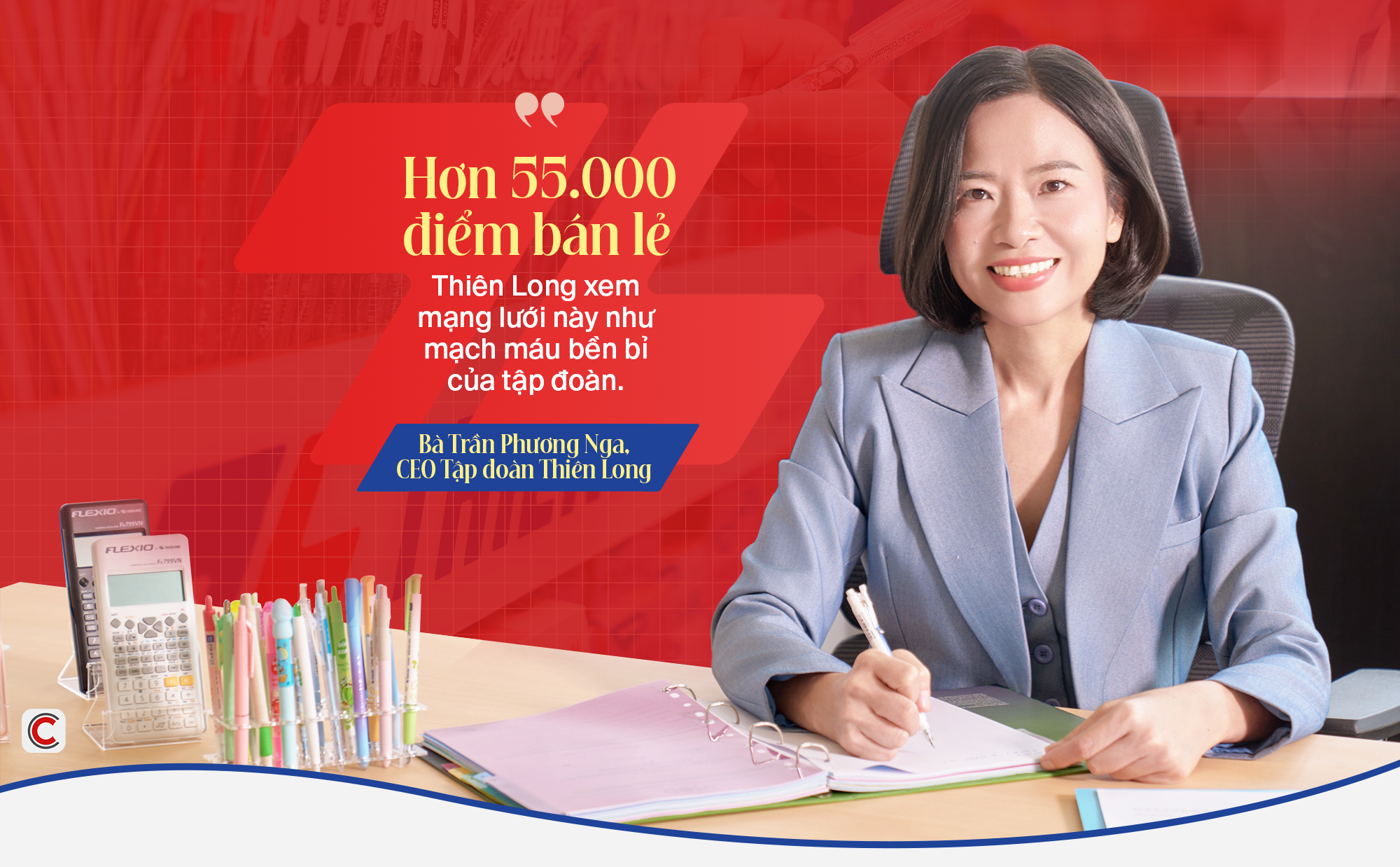
E-commerce helps Thien Long reach customers more easily but also forces you to compete with many low-priced rivals on the platforms. What is Thien Long’s competitive advantage in this race?
Every industry faces this challenge as e-commerce platforms play an ever larger role. It would be disingenuous to say we have no challenges. Consumers naturally want low prices, but we remain steadfast on quality and brand credibility. Solving the equation “beautiful, cheap, durable, high-quality, reputable” is extremely hard. Our greatest competitive advantage is that the Vietnamese spirit and Vietnamese values live in every product.
We’re not dogmatic; we constantly challenge ourselves. We know there are competitive products with trendier looks, and customers have every right to try them. Young people may buy attractive, inexpensive items, but over time they may return to Thien Long after issues like clogging or ink leakage. We want products that look good and are reasonably priced, but we will never sacrifice quality.
We understand Vietnamese users—from grip habits to the smallest preferences—and design “national favorite” products accordingly. For example, pen TL-027 has a fine line that suits local taste. Recently, we also developed our own IP characters specifically for Vietnamese users instead of relying on international licenses. For notebooks, we produce versions with different grid counts and ink colors for the North and the South to suit regional preferences.
When consumers try other products and feel dissatisfied, they return—and appreciate our reliability even more. The affection Vietnamese people have for a Vietnamese brand is priceless.
That said, we’re not complacent. We continue to expand our ecosystem to serve more needs and keep the brand top-of-mind across many products. The “Vietnamese spirit” in every Thien Long product is an inimitable competitive edge—embedded not only in the product but also in distribution, the brand, and our people.
To compete, alongside improvements to core values such as ink and tips, we’ve recently given products a “new outfit” by refreshing packaging. Redesigning entire product forms would drive costs up, so we focus on packaging to increase attractiveness without raising prices too much. We’re also opening new distribution channels like e-commerce, pursuing M&A with Phuong Nam Bookstore, and partnering with publishers.
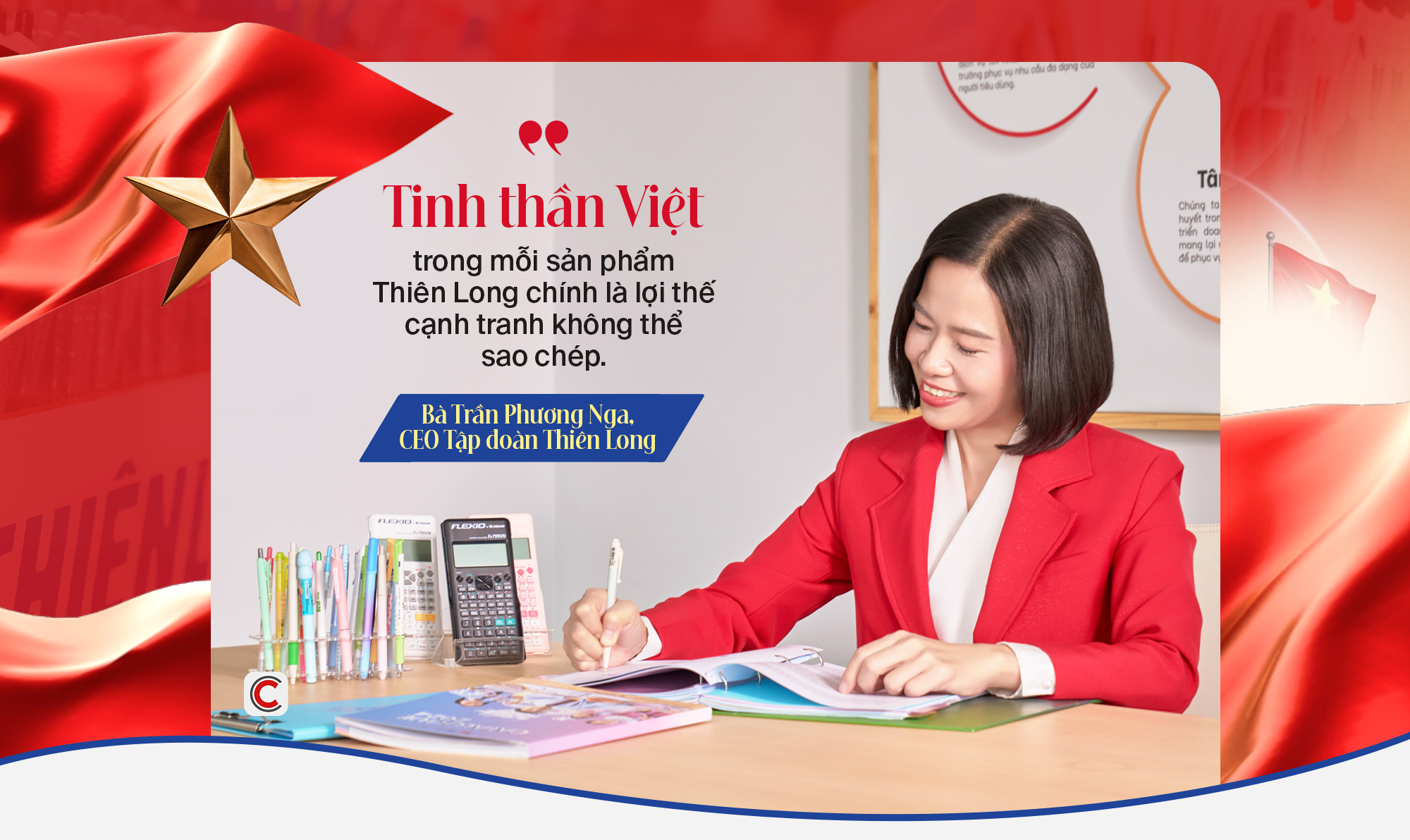
We observe that retail points now face competition from foreign brands. Has Thien Long lost many points of sale?
Those retailers still carry Thien Long products alongside Chinese brands and goods from other markets. New entrants may spend on signboards and image marketing. Even so, our products remain firmly present at those retail points.
From a business standpoint, we must weigh carefully: should we pour too many resources into a short-term image race? Instead, we choose long-term sustainability in quality. Lose quality, and you lose everything. Business is a story of perseverance; it’s not always about charging forward at all costs.
The Politburo’s Resolution 68-NQ/TW emphasizes the role of the private sector in economic development. What momentum does this give private enterprises, particularly Vietnamese companies like Thien Long?
Resolution 68 is more than a document; it creates a new mindset for private businesses. Previously, the private sector might have been seen as supplementary, but now it’s affirmed as a vital, long-term driver of the economy. This helps companies plan long-term strategies more confidently. We see it as a commitment from the state and are bolder in investment plans toward internationalization.
The resolution also boosts competitiveness through policies on R&D, workforce training, and—especially—intellectual property protection and anti-counterfeiting. These underpin sustained competitive advantage.
A major positive is the opportunity for the private sector to participate more deeply in global value chains. Emphasizing integration and elevating Vietnamese brands encourages companies like Thien Long to ramp up exports and expand international distribution.
The message “Private Sector Breaks Through, Vietnam Rises” is deeply meaningful. It reflects the resolution’s spirit: when the private sector innovates and raises productivity, overall social development follows. As private enterprises break through, Vietnam’s economic standing on the world stage improves. Economically, the private sector is an independent force vital to growth. As it innovates, scales, and boosts productivity, society advances, with more private firms and stronger growth momentum. With improved productivity comes broader social progress. As the private sector breaks through, Vietnam gains competitive strength, integrates deeper into global value chains, and steadily elevates its economic position.
Thien Long is a prime example—growing from a small shop to a global player, enhancing the nation’s image through quality products.
We break through via product innovation, export growth, and expanding categories through M&A and partnerships. In doing so, Vietnam’s image spreads globally through quality brands and competitive capability—beyond slogans to true vision. With sustained private-sector effort, Vietnam will advance strongly in economy, politics, and national image.
Each Thien Long product meets international standards while carrying the Vietnamese spirit of learning and aspiration—values formed long ago and a source of national pride. We are confident in accompanying the younger generation, helping take Vietnamese brands to the world. That is both a source of pride and a way for businesses to be part of the country’s new engines of development.
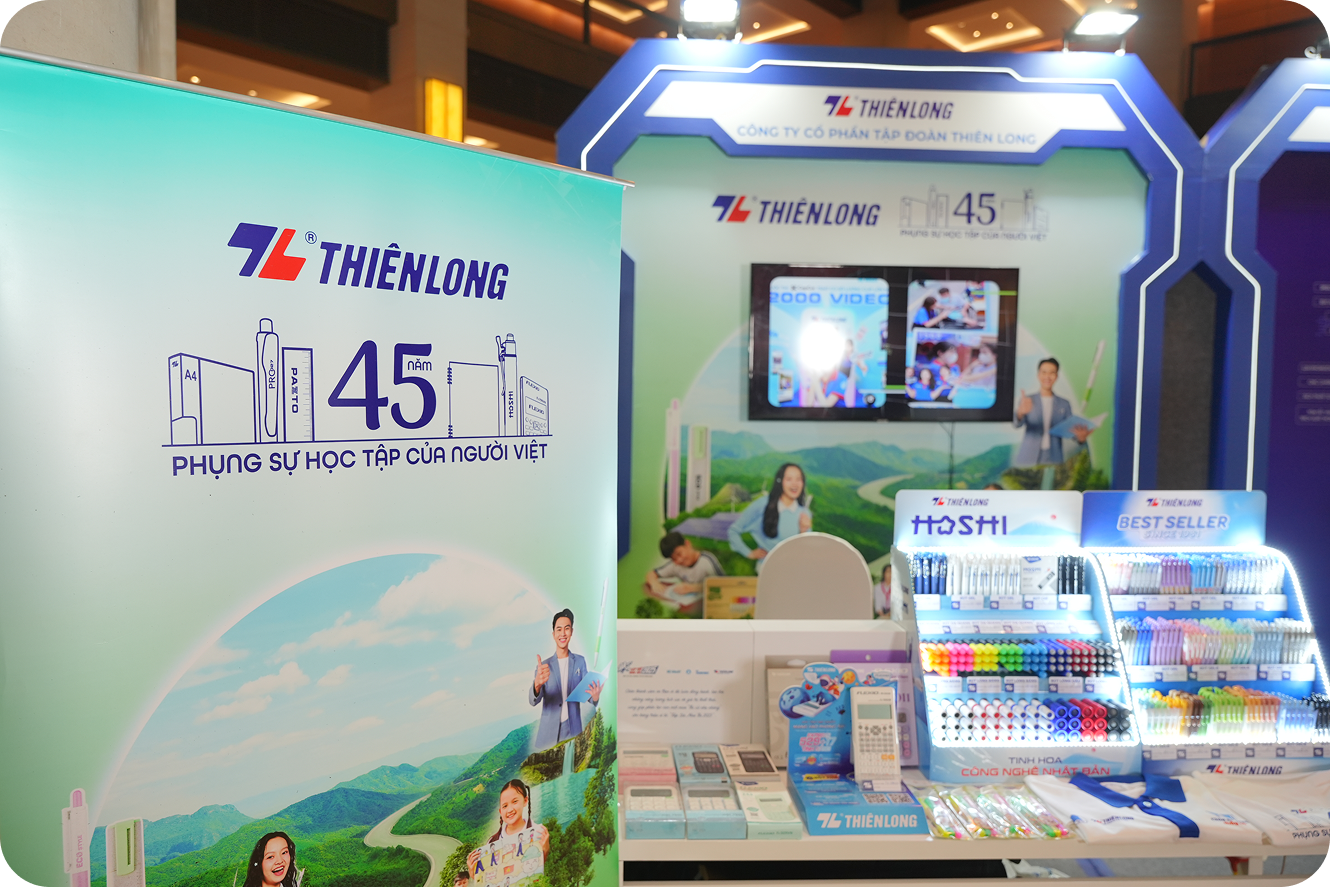
In today’s fierce competition, what are the group’s plans to defend domestic market share and take the Vietnamese brand further?
Our core remains product-led competition. Our strategy expands in both breadth (diversifying products to serve more users) and depth (taking root and deeply understanding consumers).
Second, we focus on increasing brand love. When the market offers countless choices, consumer affection is the most precious asset. We nurture it through product quality, business ethics, and community contributions.
To go far globally, we must first stand firm at home. In Vietnam, we protect market share by continuously listening, understanding, and innovating. We believe that once we fully earn Vietnamese consumers’ trust, we can take that identity to conquer the world.
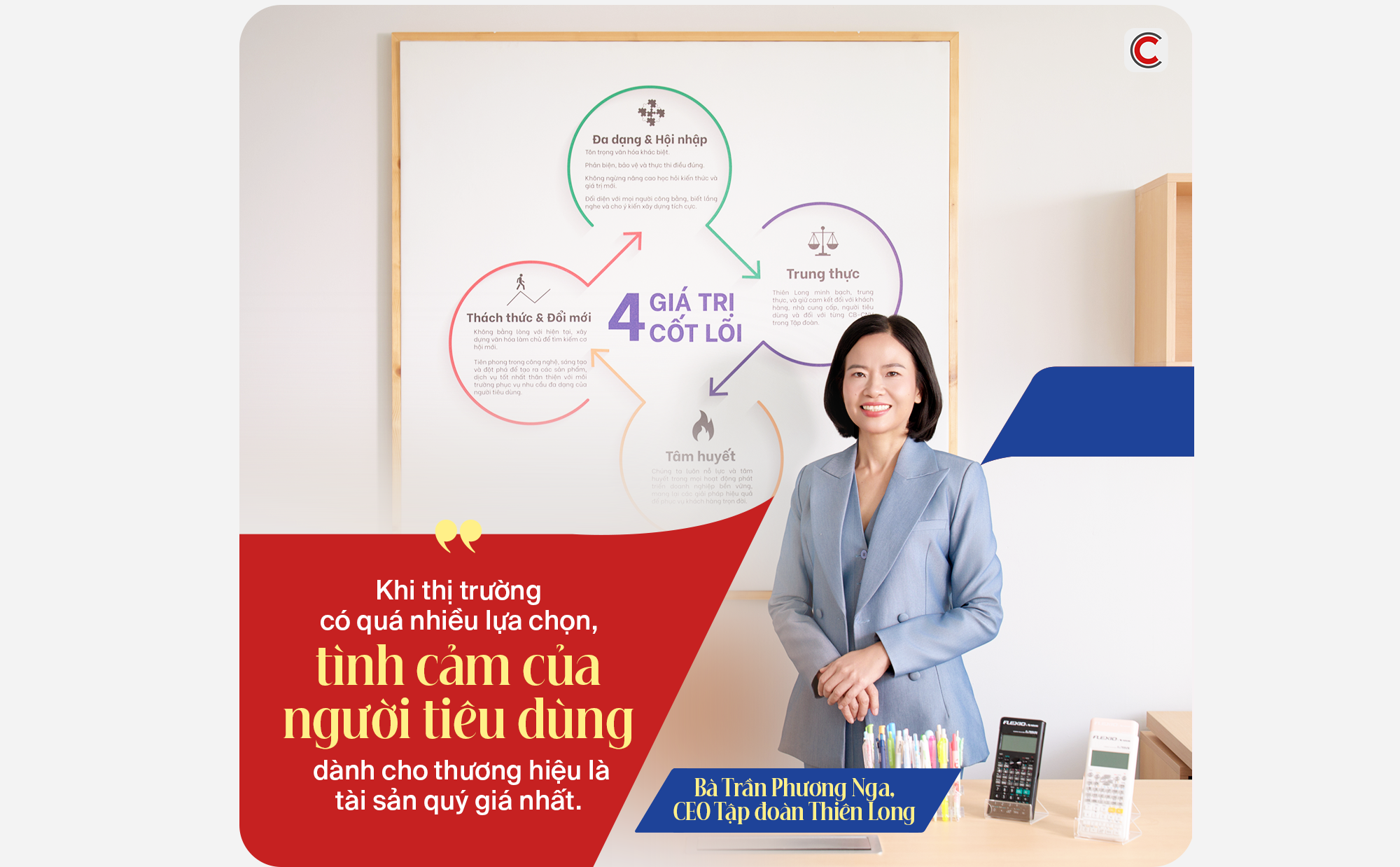
Some say emotional connection can’t compete with economics, especially with Gen Z. How does Thien Long practically spark and grow brand love?
Our “emotion” is not empty words. It shows in hundreds of daily actions: the dedication of our teams who care for each retail point; meticulous merchandising; pulling damaged goods; careful logistics. That dedication expresses warmth while delivering tangible benefits to consumers and retailers. The benefit isn’t merely a 200–500 VND discount—it’s that Thien Long products arrive fastest and meet needs best.
As foreign brands push harder, we must accelerate innovation to strengthen brand love. We’ve launched products celebrating Vietnamese cuisine (pens featuring pho, cơm tấm, bánh mì), eco-friendly items, and meaningful programs like the long-running “Exam Season Support.”
Brand love also comes from the shared aspiration to build a strong nation and take Vietnamese products global. As we go abroad, we also learn international standards and bring them back to serve Vietnamese consumers better.
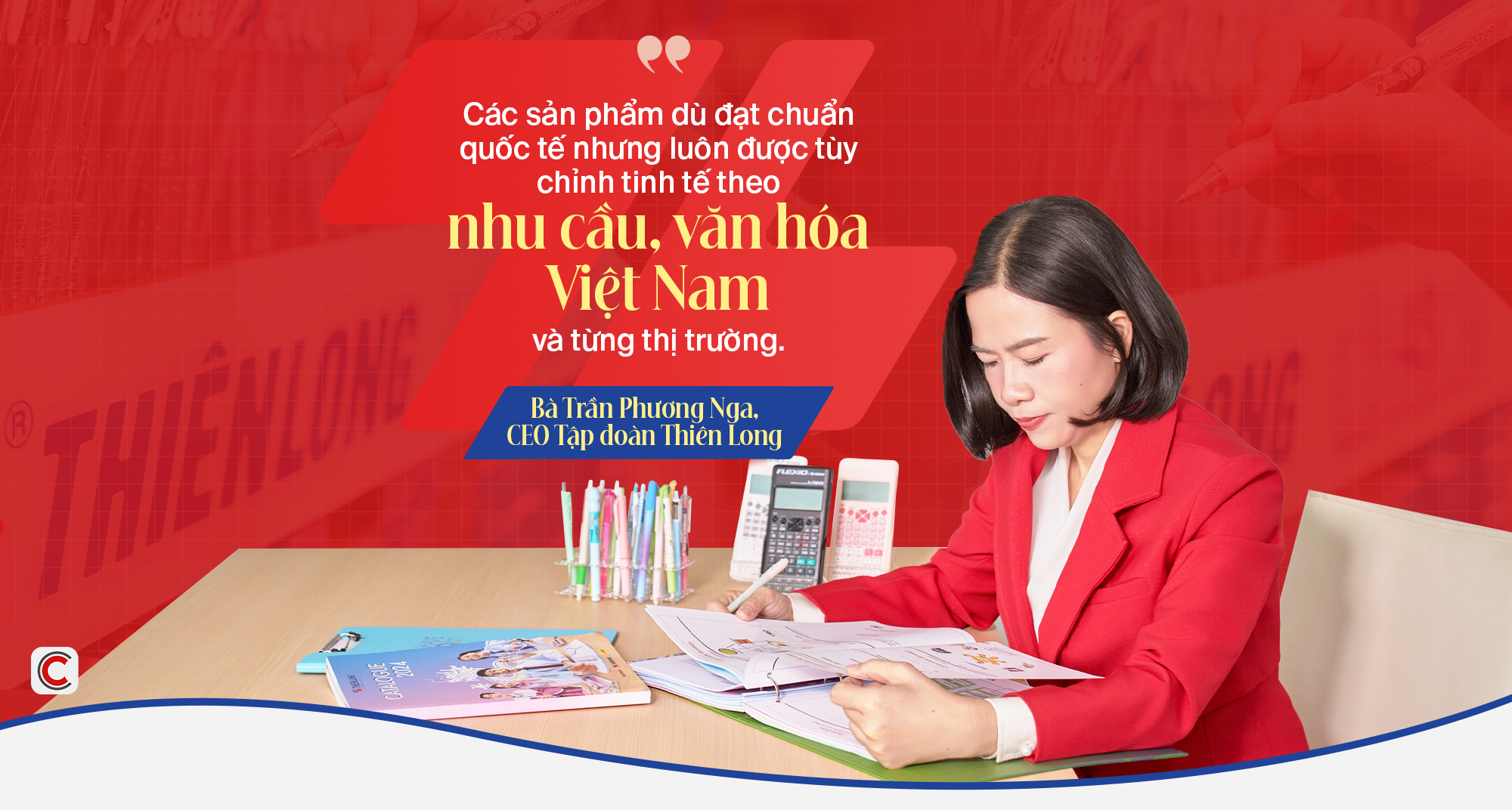
How has the “Vietnamese” element helped Thien Long in its Glocalization strategy?
We bring international standards into every product while adapting to local needs and culture. Even products sold in Vietnam meet global standards yet are finely “tailored” for Vietnamese users. Likewise, in overseas markets, products are developed on Vietnamese foundations but always customized to local tastes and culture.
As we expand globally, we adhere to this principle—keeping global quality while creating local closeness, building a strong, sustainable brand at home and abroad. International standards for us extend beyond products to business ethics and manufacturing—such as prohibiting child labor and ensuring product safety. Though these standards can raise costs versus some competitors, we remain steadfast in our quality commitments.
Our products are developed for Vietnamese needs and prices suited to the local market, yet they still meet international quality. We continuously learn from global partners, from design to international creative centers, so that every detail reflects global benchmarks. When we go abroad, we don’t pursue short-term sales; we carry the reputation of the Vietnamese people. Therefore, quality and credibility come first.
In integration, we emphasize a learning mindset—from R&D to retail execution—distilling the best values into the company. The combination of domestic and export markets rests on three elements: heart, vision, and empathy. This is our differentiator. Short-term difficulties may arise, but this builds long-term competitive advantage. At Thien Long, every employee and leader embraces a sustainable future over the easy path to quick results.
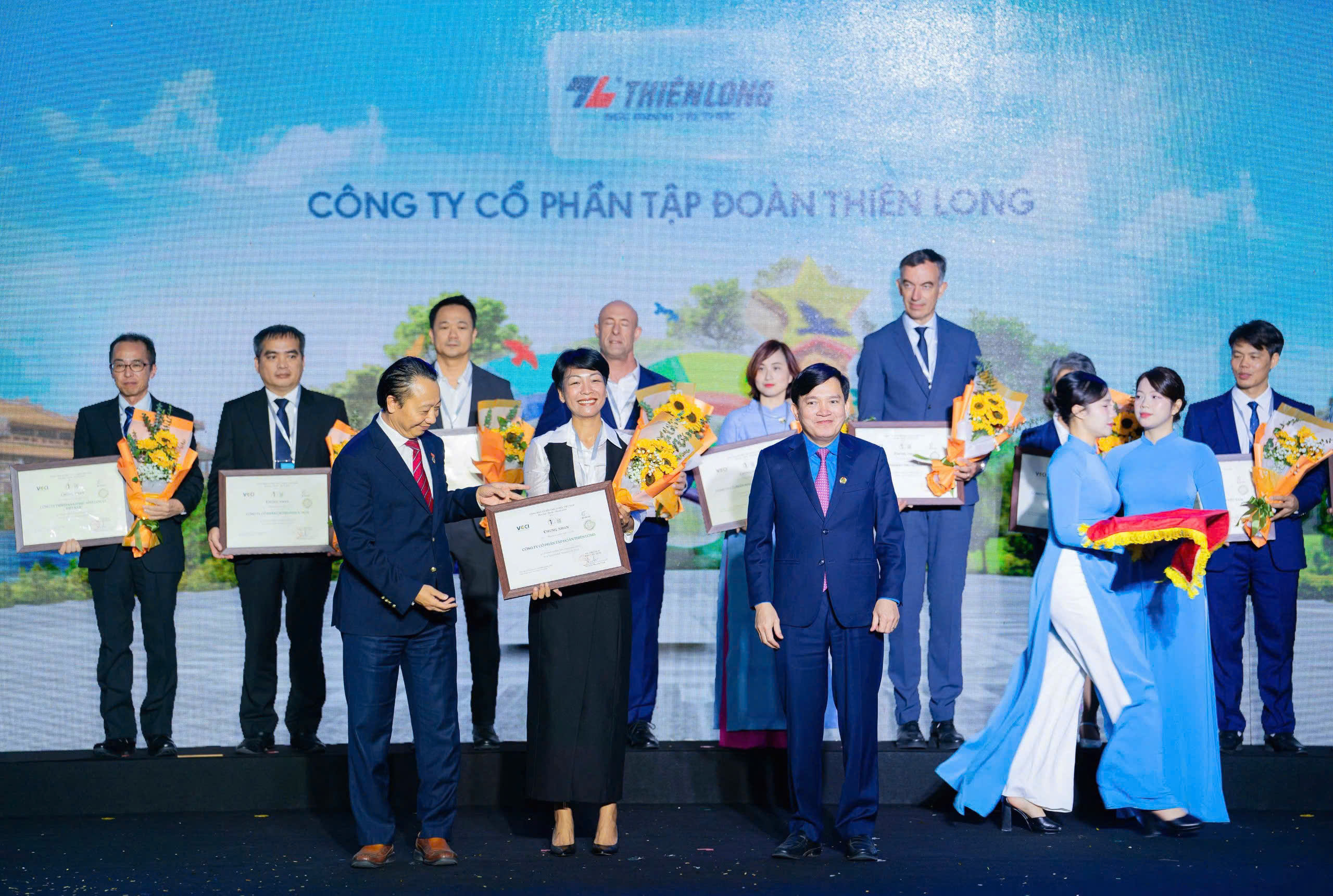
Thien Long Ranks Among Top 100 Sustainable Enterprises 2025 (CSI)
Thien Long Group has been honored as one of the Top 100 Sustainable Enterprises 2025 at the CSI Program announcement ceremony organized by VCCI and VBCSD-VCCI on December 5th in Hanoi, in recognition of our fundamental and effective efforts in sustainable development.
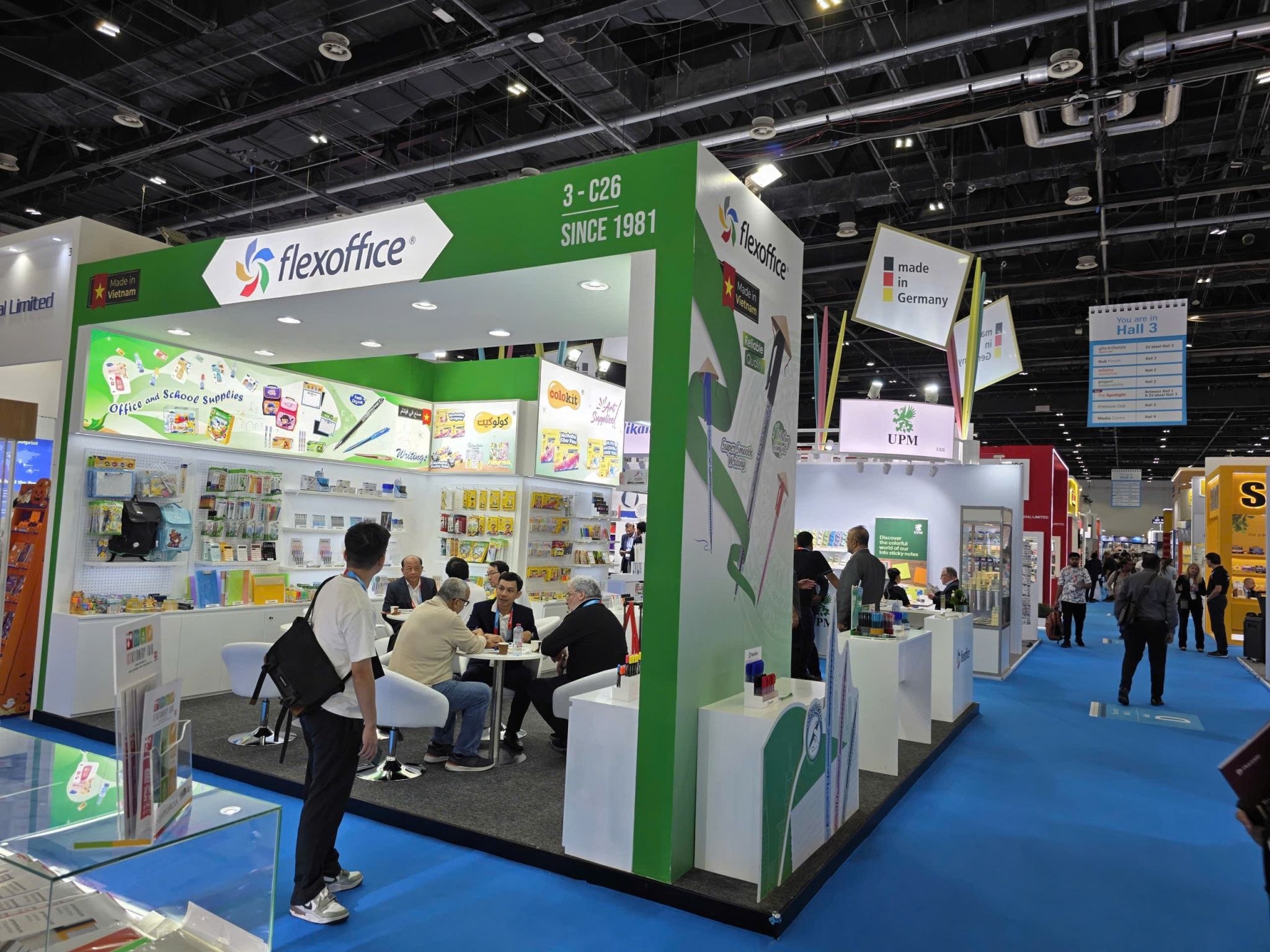
FlexOffice Highlights Vietnamese Stationery Innovation at Paperworld Middle East 2025
FlexOffice, the export-oriented brand of Thien Long Group, reaffirmed our strong market presence at Paperworld Middle East 2025, the region’s leading international exhibition for stationery and gifting products. The event took place from November 11-13, 2025 at the Dubai World Trade Centre and gathered more than 500 businesses along with many prestigious global brands in the stationery industry.
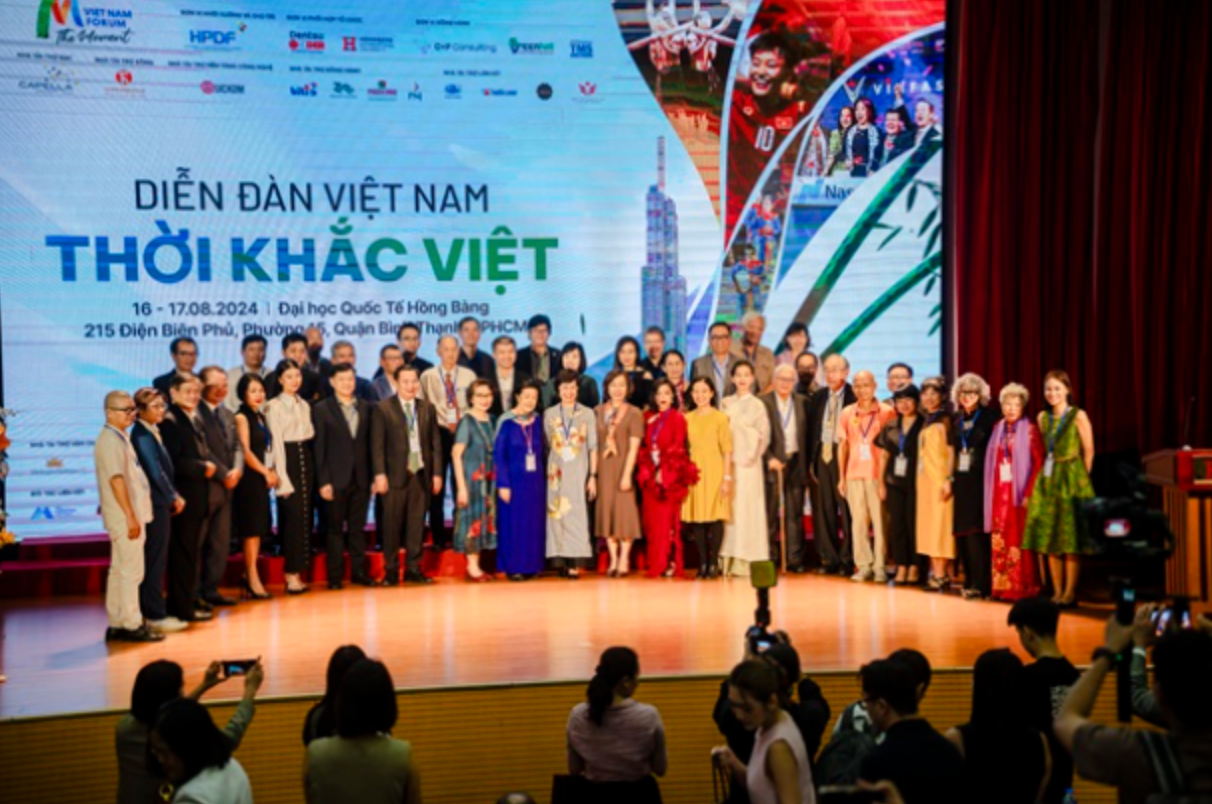
Thien Long – Vietnamese Brand Writing Sustainability
"The journey of creating simple, familiar products by thien long is the crystallization of vietnamese hands and intelligence, serving vietnamese people and aiming for sustainability" – Ms. Tran Phuong Nga, CEO Of Thien Long Group, shared At Thoi Khac Viet Forum.